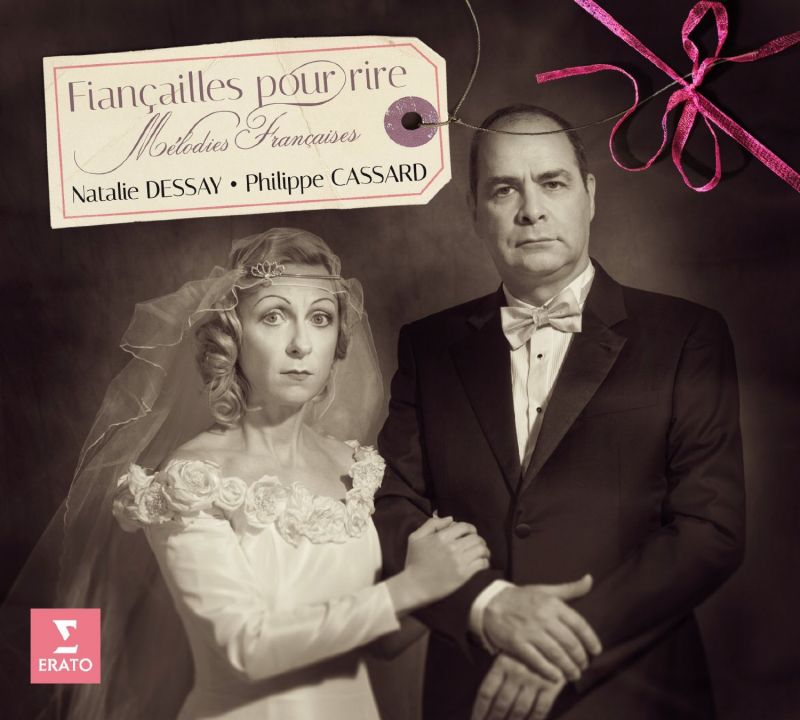Fiançailles pour rire
View record and artist detailsRecord and Artist Details
Composer or Director: Francis Poulenc, (Marie Eugène) Henri Duparc, (Amedée-)Ernest Chausson, Gabriel Fauré, (Alexis-)Emmanuel Chabrier
Genre:
Vocal
Label: Erato
Magazine Review Date: 10/2015
Media Format: CD or Download
Media Runtime: 62
Mastering:
DDD
Catalogue Number: 2564 61144-0

Tracks:
| Composition | Artist Credit |
|---|---|
| Apres une Rêve |
Gabriel Fauré, Composer
Gabriel Fauré, Composer Natalie Dessay, Soprano Philippe Cassard, Piano |
| (5) Mélodies, Movement: No. 2, En sourdine |
Gabriel Fauré, Composer
Gabriel Fauré, Composer Natalie Dessay, Soprano Philippe Cassard, Piano |
| (5) Mélodies, Movement: No. 1, Mandoline |
Gabriel Fauré, Composer
Gabriel Fauré, Composer Natalie Dessay, Soprano Philippe Cassard, Piano |
| Claire de lune |
Gabriel Fauré, Composer
Gabriel Fauré, Composer Natalie Dessay, Soprano Philippe Cassard, Piano |
| (2) Songs, Movement: Prison (wds. P. Verlaine) |
Gabriel Fauré, Composer
Gabriel Fauré, Composer Natalie Dessay, Soprano Philippe Cassard, Piano |
| (4) Songs, Movement: No. 3, Spleen (wds. Verlaine: 1888) |
Gabriel Fauré, Composer
Gabriel Fauré, Composer Natalie Dessay, Soprano Philippe Cassard, Piano |
| Chanson pour Jeanne |
(Alexis-)Emmanuel Chabrier, Composer
(Alexis-)Emmanuel Chabrier, Composer Natalie Dessay, Soprano Philippe Cassard, Piano |
| Fiançailles pour rire |
Francis Poulenc, Composer
Francis Poulenc, Composer Natalie Dessay, Soprano Philippe Cassard, Piano |
| Colloque |
Francis Poulenc, Composer
Francis Poulenc, Composer Laurent Naouri, Baritone Natalie Dessay, Soprano Philippe Cassard, Piano |
| (3) Poèmes de Louise de Vilmorin |
Francis Poulenc, Composer
Francis Poulenc, Composer Natalie Dessay, Soprano Philippe Cassard, Piano |
| Chanson perpétuelle |
(Amedée-)Ernest Chausson, Composer
(Amedée-)Ernest Chausson, Composer Ébène Quartet Natalie Dessay, Soprano Philippe Cassard, Piano |
| (7) Mélodies, Movement: No. 7, Le colibri (wds. Leconte de Lisle) |
(Amedée-)Ernest Chausson, Composer
(Amedée-)Ernest Chausson, Composer Natalie Dessay, Soprano Philippe Cassard, Piano |
| (Le) Temps des lilas |
(Amedée-)Ernest Chausson, Composer
(Amedée-)Ernest Chausson, Composer Natalie Dessay, Soprano Philippe Cassard, Piano |
| Au pays où se fait la guerre |
(Marie Eugène) Henri Duparc, Composer
(Marie Eugène) Henri Duparc, Composer Natalie Dessay, Soprano Philippe Cassard, Piano |
| Soupir |
(Marie Eugène) Henri Duparc, Composer
(Marie Eugène) Henri Duparc, Composer Natalie Dessay, Soprano Philippe Cassard, Piano |
| Extase |
(Marie Eugène) Henri Duparc, Composer
(Marie Eugène) Henri Duparc, Composer Natalie Dessay, Soprano Philippe Cassard, Piano |
Author: Tim Ashley
Dessay’s tone can nowadays turn acidic under pressure and a pulse creeps in from time to time, most noticeably in the opening Fauré group. You can’t fault her dynamic control or sense of line, but anyone who equates Chausson with pristine tonal beauty or Duparc with voluptuous warmth may find the voice itself unsettling. Against that must be set Dessay’s beguiling way with words. The almost casual intimacy with which she projects a text is very apparent in Poulenc’s two de Vilmorin cycles, the reflective Trois poèmes and Fiançailles pour rire itself, in which she holds the music’s emotional directness and de Vilmorin’s riddling imagery in perfect balance. In Fauré’s Verlaine settings, the words, similarly, speak as much as the music: the sly wit with which she delivers ‘Mandoline’ is utterly beguiling. Her Duparc can be disquieting: ‘Au pays où se fait la guerre’ is a study of gathering unease, in which the usual nostalgia, we realise, actually has little place; ‘Extase’ sounds vaguely indecent, as it should.
Cassard is wonderfully elegant, refined and super-subtle throughout. There are a couple of guest appearances, mercifully free from gimmickry. Laurent Naouri, Dessay’s husband, joins her for Poulenc’s regretfully erotic ‘Colloque’. The Quatuor Ebène, meanwhile, do fine things in Chausson’s ‘Chanson perpétuelle’, much recorded of late: Dessay is more overtly tragic here than Marie Nicole Lemieux (Naïve) and Karine Deshayes (Aparté) in their recent versions. Stick with the disc if you’re unsure of it at first hearing – it takes its time to fully yield its secrets and get under your skin.
Explore the world’s largest classical music catalogue on Apple Music Classical.
Included with an Apple Music subscription. Download now.

Gramophone Digital Club
- Digital Edition
- Digital Archive
- Reviews Database
- Events & Offers
From £9.20 / month
Subscribe
Gramophone Club
- Print Edition
- Digital Edition
- Digital Archive
- Reviews Database
- Events & Offers
From £11.45 / month
Subscribe
If you are a library, university or other organisation that would be interested in an institutional subscription to Gramophone please click here for further information.






